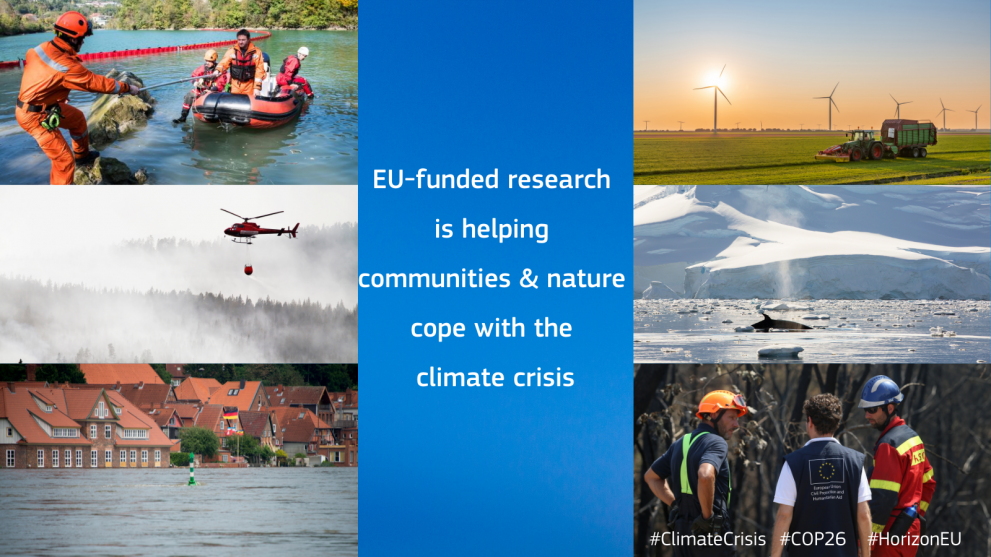
This year, the UN’s 26th global conference on climate change brings together 197 countries from the EU and around the world to take action for a safer future.
As the world continues in its fight against climate change, it is important to not just mitigate future climate crises but to adapt and react to the ones that are affecting us now. Policies such as the EU Mission on Adaptation to Climate Change, the EU Adaptation Strategy as well as the newly-adopted Joint Communication on a stronger EU engagement for a peaceful, sustainable and prosperous Arctic focus on using all the tools at our disposal to address the climate-related problems we are currently experiencing. Wildfires, droughts, rising seas, extreme cold and flooding have increased over the past years. Adaption is vital for a safer and more eco-friendly planet. It helps us work on effective solutions now which will be beneficial for years to come.
The European Research Executive Agency (REA) manages many projects funded under the EU research and innovation programme Horizon 2020 that are currently working in the field of adaption to create a safer future for the planet. Read more about some of our key adaption projects below!
1. PROTECTING THE ARCTIC
With the Arctic’s unique landscape under threat, it’s important to look towards the region directly for solutions, both at on land and at sea. Arctic Hubs is one organisation helping on the ground. Its slogan “global drivers, local consequences” aims to facilitate the economic development of the Arctic while reducing the impacts to the ecosystem and cultures of local populations.
One of its main projects is the development of the Unmanned Forestry Machine (UFM), developed at Luleå University of Technology with the Swedish University of Agricultural Sciences. The machine is equipped with numerous sensors and cameras and collects data. It will eventually be able to take decisions as it works; enabling more precise forestry planning in the future. This is just one of many projects being undertaken in the Arctic region, including EU-PolarNet. The EU supports research to better understand the region’s role in the global system and to tackle environmental and climate change in the Arctic.
2. HELPING OUR RURAL REGIONS
DESIRA is a Horizon 2020 project coordinated by the University of Pisa which involves 25 partner organisations across Europe. It respond to the challenges that digitalisation poses in rural areas. One of its initiatives, Living Labs, will focus on sustainable solutions for agricultural, rural and forestry organisations stretching across Europe from Spain to Poland. In Croatia, Living Labs explores how to connect sustainable small farmers to tourists and consumers. In rural Scotland, it will seek to improve the performance of SMEs in rural areas, by evaluating the impact of digitalisation on small-scale agricultural holdings.
3. SAVING OUR OCEANS
iAtlantic is an EU-funded research project which measures the health of ecosystems across the entire Atlantic Ocean from Argentina to Iceland. Through collaboration between scientists throughout the Atlantic region, one of its aims is to determine the resilience of deep-sea animals to threats such as temperature rise, pollution and human activities. iAtlantic will also host an event in Edinburgh during the COP26 Conference, called “An Evening Dip into the Deep Ocean.” It will include the screening of a short film featuring Sir David Attenborough.
4. CITIZEN SUPPORT
As part of climate adaption, it’s important to involve citizens, and Crowd4SDG does just that. Named for the UN Sustainable Development Goals, it promotes citizen science projects with a focus on climate action. It also researches how Artificial Intelligence apps can improve the monitoring of SDG targets by citizens. One initiative by citizens supported by Crowd4SDG is Potamoi, named after the Greek gods of rivers and streams in mythology. Potamoi will optimize the process of data-cleaning to improve flood forecasts and to reduce the number of deaths from floods and damaged properties.
5. THE FIGHT AGAINST WILDFIRES
In Europe and Australia, thousands of square kilometres of forest and land are destroyed every year in wildfires. The recent GEO-SAFE project was a wildfire research network linking researchers and firefighting agencies from six European countries and Australia. They exchanged knowledge, ideas and experience to be able to deal more efficiently with fires. The project made significant advances in mapping out risk and improving evacuation procedures. It developed innovative new tools for fire management, simulating the safe evacuation of communities and using drones to take more detailed pictures of affected regions. This assists wildfire managers in making decisions and assessing alternatives during a real-life fire.
READ MORE
EU Climate adaptation strategy
How climate services can help decision-taking in a changing climate
Details
- Publication date
- 4 November 2021
